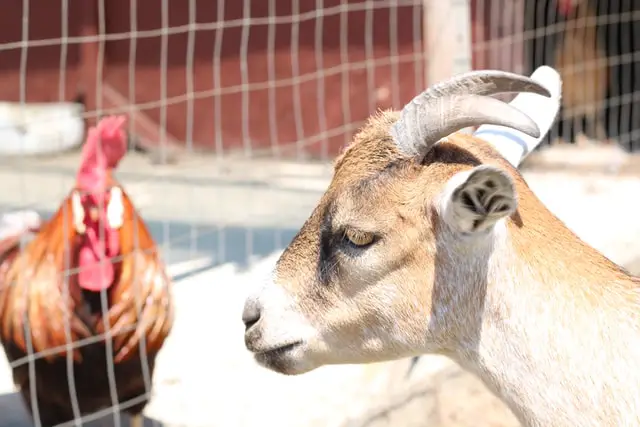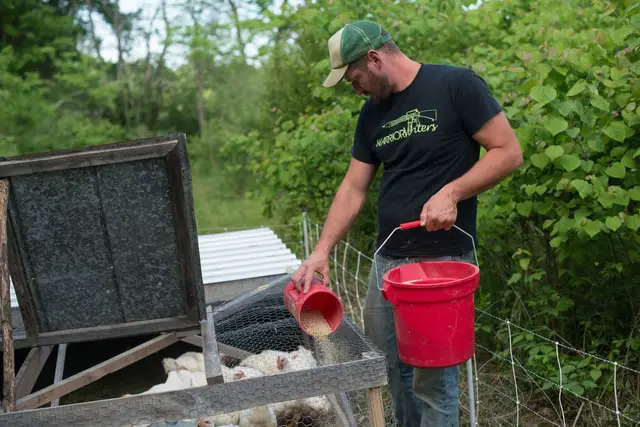Can You Keep Chicken Feed Outside the Coop
Some crucial items in keeping a flock of chickens are the feeder and waterer. While getting the waterer and feeder might be a simple task, identifying the best place then is not as easy. Should the feeder be placed in the coop? Should the water be on the run? Where do you place the chicken feeder and waterer in winter?
I must admit that I have been moving my feeders and waterers now and then. This is because I would like to find the ideal place to place them. What I have discovered is that there might not be a permanent place to place them because the needs of the chickens change with seasons and the nature of the flock.
A rule of thumb when deciding where to place your chicken feeder is to make the decision based on the needs of your chickens. What works well for your chickens? The second consideration is how convenient it would be for you, especially in the winter months.
Table of Contents
- 1 When put the Chicken Feeder and Waterer in the Coop.
- 1.1 Birds and Rodents
- 1.2 Coop as a Brooder
- 1.3 During Winter and Rainy Seasons
- 1.4 Keeping Domestic Animals from Eating Chicken Feed.
- 2 When to Put the Chicken Feeder and Waterer in the Chicken Run.
- 2.1 No Space in the Coop for Feeders and Waterers.
- 2.2 Feed will Attract Rodents in the Coop.
- 2.3 Prevent Dampness in the Coop.
- 2.4 Pastured Chickens.
- 2.5 Reduce Chicken Droppings in the Coop.
- 3 Do Chickens need Water and Feed at Night?
- 4 Final Thoughts
When put the Chicken Feeder and Waterer in the Coop.
While most people never put the chicken feeders and waterers in the coop, there are some scenarios where you will need to put the feeders in the coop. These are if you are using the coop as a brooder, when you do not want birds to eat your chicken feed on the run, during winter or rainy seasons and keep the feed away from other farm animals like goats and horses.
Birds and Rodents
A challenge many poultry keepers encounter when they put feed outside the chicken coop is the feed is eaten by other birds and animals. Birds and rodents might not easily get into your fortified coop, but will get into your run to eat your chickens' feed. This will not only put a dent in your feed budget but birds and rodents can be carriers of diseases. These diseases can not only affect the production of your flock, but can be fatal. Is it a good practice to place chicken feed in the coop in order to avoid wild birds and rodents?
Coop as a Brooder
When using a coop as a brooder, you must put the feeder and waterer in the chicken coop. This is because young chicks will not get out of the coop to go look for food and water outside.
During Winter and Rainy Seasons
During winter and rainy seasons, your chickens might spend more time in the coop than outside. It is intuitive to place the feeder and waterer where the chickens are. Water placed outside will most likely freeze, making it inaccessible to your chickens. Snow will also fall on the feed in open feeders. This will make it harder for chickens to access the feed. Feed placed outside might develop mold. Moldy feed is not good for chickens.
Keeping Domestic Animals from Eating Chicken Feed.
One of the reasons you might want to keep the chicken feeder in the coop is to prevent other animals in the backyard or homestead from eating your chicken feed. Goats are notorious chicken feed eaters.

If goats can access the chicken feed they will eat all of it in a matter of minutes. Large animals like horses and goats will knock down chicken feeders in order to access the feed. This means your chickens will most likely starve.
When to Put the Chicken Feeder and Waterer in the Chicken Run.
Most poultry keepers advocate placing chicken feeders and waterers in the chicken run or the free range area. This leaves the coop for laying eggs and a roosting place at night. The reasons for placing the chicken waterers and feeders in the chicken run are when there is no space in the coop, avoiding rodents in the coop, preventing wetness in the coop, when raising pastured chickens and reducing the amount of droppings in the coop.
No Space in the Coop for Feeders and Waterers.
Most chicken keepers start with small coops. This means that the space in the coop is enough for the few chickens they are keeping. The space in the coop might not be able to accommodate a feeder and a waterer.
Even if the coop can fit a feeder and waterer, you do not want chickens spending the whole day in the coop. They will soil the litter in a short time. This means you might need to be changing beddings every now and then.
Feed will Attract Rodents in the Coop.
Rodents, especially chickens and mice, are easily attracted to feed. They can smell food from a distance. Keeping the chicken feeder in the coop is a sure way of attracting mice and rats into the coop. Even if the coop is completely rodent proof, rats and mice will keep attempting to get in if there is feed in the coop.
Prevent Dampness in the Coop.
Keeping the waterer in a small coop is also not a good idea. If the waterer is tipped over by the chickens, most of the coop will get damp. A damp coop is a breeding ground for pathogens that can make your chickens sick.
Pastured Chickens.
If you are raising your chickens on pasture, you will not be using a coop after the chickens are out of the brooder. This means the chicken feeder and waterer will be outside in the chicken tractor. Some pastured chicken keepers prefer not to use a feeder at all. They spread the feed on the ground so as to encourage the chickens to scratch and scavenge for worms and other bugs.

If the pastured chickens are being raised in a schooner, the feeder and waterer are placed inside. There is no risk of dampness since schooners are moved on a daily basis.
Reduce Chicken Droppings in the Coop.
Chickens will spend most of their time in the coop when the chicken feeder and waterer is placed in the coop. This is because chickens eat in small bits throughout the day.
When chickens spend most of the time in the coop, as compared to the run or range, they will drop their poop in the coop. With no time the litter in the coop will be spent and will need to be changed. Changing the litter bedding in the coop has a cost associated with it.
Keeping the feeder and the waterer out of the chicken coop will mean most of the chicken droppings will be in the run or free range area, where you do not have to clean it.
Do Chickens need Water and Feed at Night?
One thing you will notice about chickens is they will feed early in the morning, throughout the day and try to eat the last feed before the sun sets. This is because chickens do not feed at night. They spend the night roosting and resting – sound asleep.
This means you do not need to put the feeder or waterer in the coop at night. Chickens will not come off their roosts to feed. An exception for this is if you are keeping Cornish cross meat birds. Meat chickens are bred to be eating machines. If you need them to gain weight quickly, you will need to make feed and water accessible throughout the day and night.
Final Thoughts
There is no standard rule on where to keep the feeder and waterer. Whether to place the feeder and waterer in the coop or run is left at the discretion of the poultry keeper. The location of the feeder or waterer might change from season to season. Placement of the chicken feeder and waterer should be done to meet the needs of the chickens and their keeper.
Source: https://polystead.com/chicken-feeder-and-waterer-coop-or-run/
0 Response to "Can You Keep Chicken Feed Outside the Coop"
إرسال تعليق